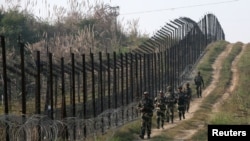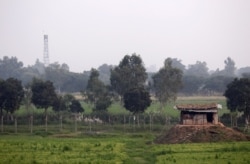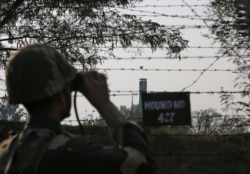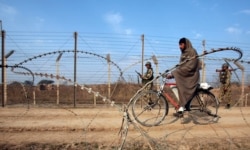When half a dozen trucks loaded with construction material screeched to a halt on their farms, Baryam Singh and fellow residents in the Indian village of Bobiya sensed they were soon going to lose more land to the military.
The farmers chased away the contractors and laborers with protests and threats of deflated tires, knowing it was only a temporary reprieve.
"The military infrastructure has been growing in our village and our farmlands are shrinking," Singh told the Thomson Reuters Foundation, as other farmers sitting around him nodded.
"More than 50% of our agricultural land is under military lockdown," he said of the village on the border with Pakistan.
Over the past 15 years, the Indian army and the country's Border Security Force (BSF) have been acquiring land to fortify defenses in the border districts of Jammu and Kashmir, according to the Border Welfare Committee, a local organization campaigning for the rights of border residents.
Both India and Pakistan administer the disputed state of Kashmir in part while claiming it in full.
The fertile land where Jammu and Kashmir meets Pakistan has become dotted with barbed wire and landmines, leaving hundreds of farmers cut off from their farms, often with no warning or compensation, said Bobiya villagers.
"This is adding to the economic distress of farmers who don't have alternative sources of livelihood," said Singh.
After India revoked the autonomy of its portion of Kashmir in August, farmers in border areas now fear losing even more of their land to the military, according to ID Khajuria, an activist who heads up the Jammu and Kashmir Forum for Peace and Territorial Integrity.
With India bringing Jammu and Kashmir deeper into its fold, the central government will have greater power to seize territory in the border regions in the name of national security, he warned.
"The local elected political representatives will now have a very limited say in the functioning of the (Jammu and Kashmir) government," Khajuria said.
Jammu divisional commissioner Sanjeev Verma said that all farmers in Jammu province would eventually be paid for their land.
"Whatever new agricultural land is being acquired, the farmers will get financial compensation," he said in a phone interview.
Some have already been compensated, he added, though he declined to specify how many.
'I am landless now'
The defense system includes a fence of about 900 km (560 miles) in length that sits several kilometers into India from the border, slicing through villages and leaving vast tracts of farmland on the other side of the fence towards Pakistan.
India's government is also working on a "Wall of Defense" along the border between India and Pakistan, according to the Border Security Force.
The project consists of a 10-meter-high (32-foot) mud embankment to protect residents of India's border villages from frequent cease-fire violations that both sides blame on each other.
There are also plans to install high-tech surveillance systems to plug gaps where physical surveillance is not possible, India's ministry of home affairs announced last year.
Members of the Border Welfare Committee — which is based in the city of Kathua — said that thousands of hectares of Indian farmland now sit untouched on the other side of the fence.
Technically, farmers can still get to their land, but the checkpoints in the fence are opened only during specific times of day and farmers have to walk for hours to reach their fields, explained Bharat Bhushan Sharma, the committee's vice president.
Even if they do manage to successfully cultivate their crops, "there is always a threat of cross-border fire," said Sharma, who is also head of Bobiya village. "And then (they) can't protect their crops from wild animals."
Committee president Nanak Chand, 87, said he lost almost eight hectares of land to the fence when it was first built in 2004.
"Three months ago, the military acquired the remaining two hectares of farmland as well," he said. "I am landless now."
Chand was given 3 million rupees ($42,000) as compensation, which he says is not enough to buy himself an equivalent piece of land in a peaceful part of the country.
Khajuria agreed, saying that "with developers and businessmen from other states rushing to Jammu and Kashmir, land prices are likely to soar and it would make it difficult for poor border residents to buy land in peaceful areas."
In December 2018, Chand filed a petition with the Jammu and Kashmir High Court on behalf of farmers living in the border areas of the affected districts.
The petition called for the government to pay rent for farmland on the Pakistan side of the fence and provide farmers with compensation for each crop season during which their land remains uncultivated.
The Ministry of Home Affairs, the BSF and the local administration have not yet filed their responses, according to lawyers representing the farmers.
Jugal Kishore Sharma, a member of the ruling Bharatiya Janata Party who represents the Jammu-Poonch parliamentary constituency, could not specify how much of the land along the border currently being used by the military is farmland.
But he said officials in the border districts are in the process of measuring that amount.
"Thereafter, the government will start paying rent to farmers," he said in a phone interview.
Waiting for peace
Often times, when the border fence cuts through a farm, it also isolates the village in which the farm is located, said Mohammad Arif Khan, 67, head of Behrooti village in Poonch district.
As a result, "the villages (are) deprived of even the basic facilities and infrastructure," he explained.
The huge razor-wire fence has turned Behrooti into what locals have described as an open prison.
"Our village doesn't have roads and health care facilities. There is no internet or mobile phone connectivity," said Mohammad Nisar Khan, 30, another resident. "A zoo is visited by people every day, but here the outsiders are not allowed. Socially, we are completely isolated."
The knowledge that the military plans to add high-tech surveillance equipment to the fence is disheartening, said Khan, who like many Indians living on the border is holding out hope that the fence will one day be moved onto the border itself.
"We'll become permanent prisoners if the fence gets upgraded at its current location," he said.
While the residents of Behrooti feel trapped in their village by the fence, others fear it will force them to leave their homes for good.
"There's little chance that our next generation will be in a position to continue living here (at the border)," said Meer Chand, a rice farmer in Nanga village, 30 kilometers (18 miles) from Bobiya. "We've lost hope that there will ever be peace between India and Pakistan. We have neither security of life nor livelihood."








